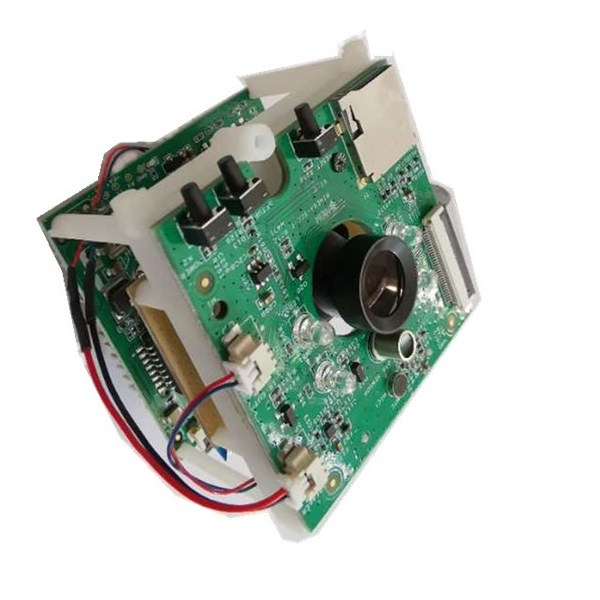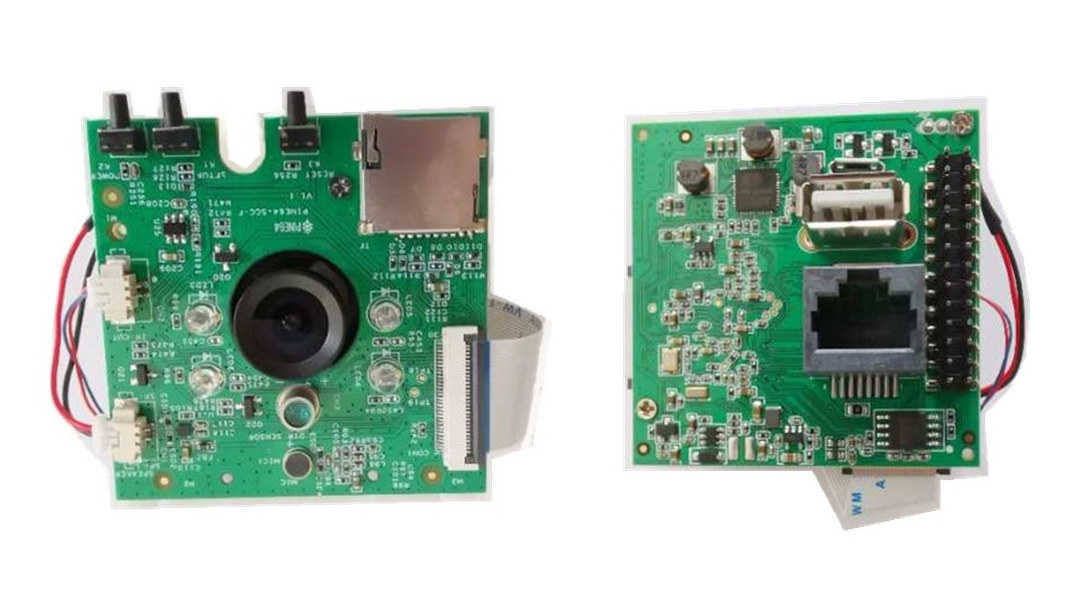Pine64 has been a busy company/community with the launch of Linux powered Arm development boards, PinePhone smartphone, PineTab tablet, and Pinebook Pro laptop in the last two years.
They also had other smaller projects that got fewer resources due to the launch of the aforementioned products and COVID-19 induced delays, and one of those is PineCube open-source IP camera development kit that finally launched for $29.99 plus shipping.
 PineCube hardware specifications:
PineCube hardware specifications:
- SoC – Allwinner/Sochip S3 Arm Cortex-A7 processor @ 800MHz with 128MB in-package DDR3 RAM
- Storage – 128Mbit SPI Nor Flash and MicroSD slot, both bootable
- Camera – 5MP OV5640 sensor
- Audio – Built-in microphone, speaker
- Display – Optional 4.5-inch RGB LCD screen (
- Networking – 10/100M Ethernet with passive PoE and WiFi
- USB – USB 2.0 Type-A host port
- Expansion – 26-pin GPIO header
- Misc – Volume and home buttons
- Power Supply
- Dimensions – 55 x 51 x 51.5mm
- Weight – 55g
Pine64 currently provides a Linux SDK for the IP camera kit, PDF schematics, and other documentation that can be found in the work-in-progress wiki. That’s probably an SDK based on Allwinner tree, and u-boot & Linux mainline may eventually support the IP camera but that may take a while and will depend on community interest in this type of hardware.
The PineCube is a development kit, meaning it’s not a end product, and instead, it’s aimed solely at developers with “extensive embedded Linux OS experience and an interest in open source IP camera or embedded computer development”.
Pine64 also announced some progress on existing products, as well as the upcoming Pinecil RISC-V soldering iron and a PineCom PDA-style IoT device with a 5-inch display and LoRaWAN, WiFi and other wireless communication protocol. You’ll find more details in the October update.

Jean-Luc started CNX Software in 2010 as a part-time endeavor, before quitting his job as a software engineering manager, and starting to write daily news, and reviews full time later in 2011.
Support CNX Software! Donate via cryptocurrencies, become a Patron on Patreon, or purchase goods on Amazon or Aliexpress





They could have gone with better sensor. The OV5640 has very poor low light performance.
This might all work with mainline plus some patches. The only piece missing has been the MIPI driver and they avoided that by using the 5640 parallel CSI sensor. The S3 SOC is an amazing value for the price.
The sorry thing here is that it took almost five years after the launch of the V3/S3 until there was decent open source support for it. Allwinner provided a kernel 3.4 SDK and then dropped working on the software. Obviously Allwinner did not care about maintaining the software for the S3. They are true idiots for not releasing it as open source. The community would have instantly picked the code up and maintained it for them.
This was huge mistake on Allwinner’s part because this chip has a strong following in the open source world. If they had cooperated on the software this chip would have been designed into hundreds of products and sold many millions more units. This is simply foolish, maybe $50K of effort on the software side would have made them millions in chip profit.
And they appear to be repeating this with the V831 (S3 next gen). The chip launched back in March. Then they had to withdraw it from the market for a hardware error. Then it came back in June. And now they say they might have the AI support tools working by Q1 2021.
I’ve seen Sipeed (Twitter account) plans to write their own open-source toolchain for the NPU inside Allwinner V831. They’ll reverse engineer it. They said it’s not Allwinner IP, so they can’t provide details.
That’s interesting.. hopefully it’s the same one that’s in the MStar/SigmaStar chips and we (I) will able to steal that :D. There should be some chips with an NPU in a hobbyist solderable package.
Who owns a product, that one buys for personal use? or
What’s the public interest on infrastructure support for private companies, if these don’t support overall progress for that societies and healthy environment (saving energy through open source hardware, software and engineering knowledge for combining all of that)?
The need for “reverse engineering” is a big disadvantage for the “capitalism” system, considering progress, social stability and saving resources …
Know of any decently sized sensor chips that will do parallel csi?
Parallel CSI is limited to 5MP. That is the limit of the bus.
H264 HW encoding also doesn’t work, right? So this may be useful for snapping photos, but not for recording video.
There is no open source implementation for encoding… but someone has done an open source implementation of the /dev/cedar device driver. And with that you can use the closed source user space libraries to encode.
There has been some effort to build a proper free driver for the cedrus vpu’s encoding capabilities too. There’s also the Hantro G1 (decoding) and H1 (encoding) on board the Rockchip RK3288.
There used to be the Firefly Reload RK3288 based board with hdmi in and 2x hdmi out.
bootlin will finish the encoder code for about $30K. Maybe they will do another kickstarter in conjunction with this board.
Is libcamera of no use, with the closed sandbox method?
Is there documentation on encoding using 5.8.x kernel, if so can you provide a link?
Any links to the V831 SDK?
Mangogeek has it.
https://sns.widora.io/topic/698/%E6%96%B0%E6%97%A7v831%E8%8A%AF%E7%89%87%E7%9A%84%E5%8C%BA%E5%88%AB/5?lang=en-US
I think I noticed this a few weeks back because someone pushed the DT and realised that it probably won’t actually work in mainline for a while. :'(
Would this work with ZoneMinder, Shinobi, iSpy etc ?
AFAIK, those software solutions work with ONVIF compliant IP cameras.
Installing something like mjpg-streamer on the camera might do the trick since it supports ONVIF. So as long as it can run with 128MB RAM it should work with some efforts.
For reference, mjpg-streamer can be installed as a snap in Ubuntu.